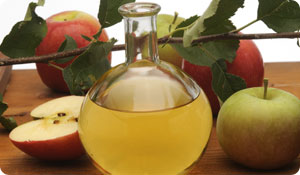
You may want to consider using a liberal hand with the vinegar bottle next time you make salad dressing.
Consuming apple cider vinegar at bedtime may have a positive effect on the waking blood sugar for those with type 2 diabetes, according to a recent study from Arizona State University in Tempe, Arizona.
For her research, Carol Johnston, Ph.D, a professor and director of the nutrition program at Arizona State, and her colleagues focused on 11 diabetics who ranged in age from 40 to 72. Nearly three-fourths of the individuals were taking medications during the study period, though none were on insulin.
The participants recorded their food intake and their fasting blood glucose levels for three days before the study began. They all followed a standardized meal plan for two days during which they consumed water and an ounce of cheese, or two tablespoons of apple cider vinegar and an ounce of cheese before bedtime.
Each of the participants got both treatments, and there was a "washout" period of three to five days in between the two treatments. The researchers found that the vinegar-cheese combination was helpful in maintaining normal blood sugar levels, especially in the diabetics whose fasting blood sugar was over 130 mg. In these participants, the fasting blood sugar was reduced by six percent.
Johnston cautions that this study is small, and says more research is needed on the topic. Meanwhile, she says, those living with diabetes should not discontinue their meds and start consuming large quantities of vinegar.
"Diabetics need to do what their doctors tell them," Johnston says. "They should definitely continue to take their medications."
She says pre-diabetics may benefit the most from consuming apple cider vinegar.
Whether or not future research studies corroborate the Arizona State vinegar findings, there's no harm in including more vinegar in the diet, says Adee Rasabi, RD, CDE, CDN, senior dietitian of the Ambulatory Care Network at NewYork Presbyterian/Weill Cornell Medical Center in New York City. "Vinegar offers flavor without the calories," she says. "It can be very good for weight control when used in a salad dressing, provided that you don't overdo it on the oil."
She likes using balsamic vinegar because it has a more mellow taste than cider vinegar.
Johnston, on the other hand, prefers white wine vinegar. "It's less astringent than cider vinegar," she says. "It's very smooth."
Whether you choose balsamic, white wine, or cider vinegar, you can add an extra splash by:
- Using it as a dip for bread, the way you would olive oil. "Dip or rub your bread into vinegar," Johnston says.
- Putting vinegar on the table just as you would any other condiment. "It's so flavorful and easy to use on food," Johnston says. "It increases the flavor of the food you eat."
- Making homemade dressings (but go easy on the oil). Most dressings have two-thirds oil to one-third vinegar. Concoct a healthier version by whipping up a dressing that has two thirds vinegar to one third olive oil. Add little extras, like mustard or fresh herbs, to taste.
Sources:
Johnston C.S., Steplewska I., Long C.A., Harris L.N., Ryals R.H. "Examination of the antiglycemic properties of vinegar in healthy adults." Ann Nutr Metab. 2010; 56(1):74-9.
http://www.ncbi.nlm.nih.gov/pubmed/20068289





